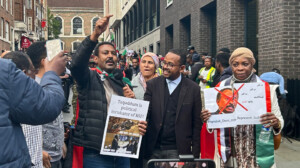Heavy security presence, detention of opposition at Omdurman protest
More details about the violent crackdown by Sudanese authorities on the large-scale protest in Omdurman on Wednesday were revealed yesterday. Journalists reported the involvement of large numbers of security forces wearing different kinds of military uniforms or in civilian clothes.
 The Omdurman mass protest on January 9 (RD)
The Omdurman mass protest on January 9 (RD)
More details about the violent crackdown by Sudanese authorities on the large-scale protest in Omdurman on Wednesday were revealed yesterday. Journalists reported the involvement of large numbers of security forces wearing different kinds of military uniforms or in civilian clothes.
The Central Sudanese Doctors’ Committee announced yesterday that the body of Huzeifa Mohamed has been identified at the Bashayer morgue on Thursday, raising the number of confirmed people killed during the Omdurman protest on Wednesday to three. He and Saleh Abdelwahab and Mohamed Khojaly have all been fatally hit by bullets that were fired by the security and riot police forces.
Mohamed was reported missing since the demonstration on Wednesday. He had recently graduated from the University of El Nilein, a relative informed Radio Dabanga. His body was buried late on Wednesday evening.
On Wednesday evening, police spokesman Hashim Ali confirmed the death toll and that 12 protesters sustained bullet wounds. Two of them underwent surgery for a gunshot in the abdomen.
Military and security forces
Demonstrators and journalists confirmed the involvement of large numbers of security forces wearing four different kinds of military uniforms, in addition to masked gunmen in civilian clothes carrying batons and electric wires to disperse the crowds that werepeacefully marching towards the Parliament in Omdurman on Wednesday.
Eyewitnesses and activists in Khartoum North (Bahri) confirmed that approximately 50 armoured vehicles with plates of the paramilitary Rapid Support Forces (RSF), the government’s main militia, headed towards Omdurman on Wednesday to support the other forces in the suppression of the demonstrators.
There have been no corroborated numbers of arrests of protesters so far.
The reports about Sudan’s heavy armed presence in the demonstrations during the past three weeks add to reported sightings of what a number of observers speculate to be vehicles and contractors of a Russian private military company. On December 26, a political observer on Twitter posted pictures of Russian-manufactured military-style trucks.
Opposition detained
Professor Nawal Khidir, a member of the National Assembly for the Popular Congress Party (PCP), said that she was detained by masked members of the security apparatus while observing the Omdurman march.
“I was subjected to beatings, humiliation, verbal violence and insults in the office of the National Intelligence and Security Service (NISS),” she reported in a press statement. She wanted to monitor the demonstrations, she explained, refuting the Minister of Interior’s description in parliament of the demonstrations being violent.
“I am surprised by the double standards of the government, where government forces protected the march to the Green Square in Khartoum on Wednesday and the participants were transported by vehicles organised by the authorities, while Omdurman demonstrations were suppressed with tear gas.”

‘Largest protests since 1989’
Zeinab Mohamed Salih, reporting for the BCC, journalists and independent witnesses have described the demonstration in Khartoum is one of the largest against President Al Bashir. He has come to power in 1989 in an Islamist-backed military coup.
More than thousands of Sudanese people marched from El Shuhada square in downtown Omdurman to the Parliament building along the Nile to hand over a memorandum demanding the immediate and unconditional step-down of President Omar Al Bashir and his regime from the rule of the country. Around that same time, a rally was held at the Green Square in Khartoum, attended by hundreds supporting President Al Bashir.
Salih said that “Many in Sudan now prefer to keep their money under the mattress rather than in banks. If people put their savings in the bank it can be hard to get out as cash machines are often empty.
“There are also queues for bread. […] As part of the austerity measures, the government has reduced subsidies on fuel and bread, leading to a rise in the cost of basic commodities. The increase in the bread price last month triggered a wave of mass protests, which are still going on. They started in the eastern city of Atbara on 19 December when the headquarters of the governing National Congress Party (NCP) were torched [video, RD].”











 and then
and then